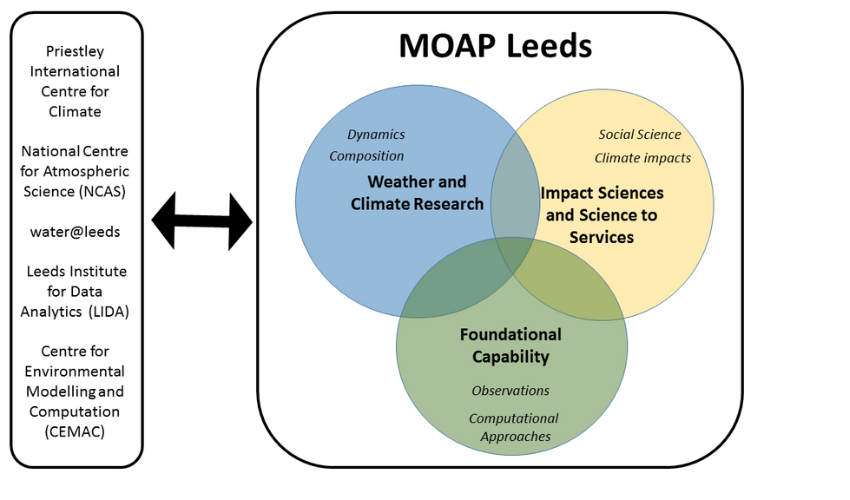Met Office Academic Partnership
The University of Leeds is a founding member of the Met Office Academic Partnership

- Faculty of Environment
- School of Earth, Environment and Sustainability
- Working in partnership
- Met Office Academic Partnership
Met Office Academic Partnership
Met Office Academic Partnership
The University of Leeds is a founding member of the Met Office Academic Partnership.
MOAP aims
- To draw together world-class expertise around a focused programme of joint research to tackle key challenges in weather and climate science and prediction
- To maximise the return on the UK's investment in research and development in its leading institutions, to provide society with the best possible advice
- To combine our strengths to secure the UK's position in leading the world in weather forecasting and climate prediction
- To build a cluster of research excellence that can be instrumental in determining priorities for future funding
- To provide an outstanding environment to develop the science leaders of tomorrow in this very challenging area of research and delivery.
MOAP Leeds
The vision of Leeds MOAP is to
draw together experts in atmospheric and climate science, impacts science, social science, computing and maths to provide research to underpin the activities needed to improve weather and climate predictions, and tackle the growing impacts of climate change, including both mitigation and adaptation.
MOAP Leeds spans and links six areas:
- atmospheric dynamics,
- atmospheric composition,
- climate impacts,
- social science,
- computational approaches,
- observations.
Find out more about our research themes
The breadth and depth of MOAP collaborative activities reflects the size of the Institute for Climate and Atmosperic Science (ICAS) and the Sustainibility Research Institute (SRI), and that the School of Earth, Environment and Sustainability is the largest concentration of earth and environmental sciences in the UK, with 96% of research rated as world-leading or internationally excellent (REF 2021).
MOAP-Leeds is organised to align with the Met Office Research and Innovation Strategy, with each of the research areas represented on the joint Met Office/Leeds governing committee, alongside ICAS, the Centre for Environmental Modelling and Computation (CEMAC), the National Centre for Atmospheric Science (NCAS), and the Priestley International Centre for Climate.

Research and impact
- MOAP-Leeds has produced almost 500 peer-reviewed papers co-authored with Met Office staff, with more than 23,000 citations.
- The Met Office is the top institution for co-authorship with ICAS (2016-2022).
- MOAP increases impact of our research, for example, MOAP work has contributed to three of 5 impact case studies submitted to the Research Excellence Framework (REF) 2021, which demonstrated impact on the delivery of weather alerts in the UK, forecasting and climate adaptation in Africa, and improved modelling of aerosol processes.
- MOAP made an instrumental contribution to the University’s 2021 Queen’s Anniversary Prize awarded for ground-breaking work in weather and climate science for the Global South. MOAP has accelerated the pace at which Leeds research has been implemented into operational weather and climate services.
- We have led and jointly participated in a large number of externally-funded research projects, many with high societal impact.
- Met Office co-supervision of research students enables solutions-driven research and impact.
Find out more about our research and impact
Joint staff and the University of Leeds MetOffice@Leeds
The partnership is supported by joint staff and the University of Leeds MetOffice@Leeds research group
MetOffice@Leeds provides capability for end-to-end research into the development and use of atmospheric and climate science for socio-economic impact, with a focus on Met Office models.
Find out more about joint staff and MetOffice@Leeds
Research collaborations and co-supervised students
Our extensive research collaborations with the Met Office are developed and maintained by a wide range of activities beyond funded projects:
- As well as joint staff, we also have a programme of staff exchanges and secondments, linked to the Met Office Continuing Professional Development (CPD) scheme.
- We have a long history of both Met Office co-supervision of PhD students through CASE studentships and Met Office staff studying part-time for a PhD at Leeds. This is increasingly expanding to our MRes and MSc projects. More information on our research degrees pages.
- Met Office engagement and speakers in our seminar series, ICAS Annual Science day and dedicated topical for bringing together Leeds and Met Office researchers.
- We lead and participate in cross-MOAP research fora (“SuperRAPs”), recently leading SuperRAPS on food systems, and on AI/ML for nowcasting.
- We lead and participate in MOAP-wide hackathons.
Find out more about our co-supervised students
Teaching
The University of Leeds offers some of the best UK taught programmes associated with careers in Meteorology and Climate Science. Our Environmental Science BSc degree includes a significant Atmospheric Science component, with a hands-on practical approach, experience in the field and research-led teaching. Our close collaboration with the Met Office means a number of our graduates go to work there in a variety of roles.
Other scientific degrees also offer an excellent preparation for work in Meteorology and Climate. In particular, the Natural Sciences BSc programme includes an Environmental Science pathway, with a wide selection of Atmospheric Science modules, while our Mathematics, Physics, Chemistry and Computing degrees are internationally excellent, and represent an excellent training to work at the Met Office or related fields. Our Physics, Maths and Chemistry include atmospheric science options.
The Met Office contributes to our strength in teaching through several collaborative activities. For example, a number of our students undertake research placements with the Met Office - often forming a basis for their final year dissertation. The Met Office also support undergraduate and masters-level prizes for best student performance and best dissertations on weather and climate science.
A number of our academic staff have joint positions with the Met Office. These and other Met Office staff contribute to our teaching programmes, and to our field courses. More information can be found on our Environmental Science BSc and MRes course pages.
Contact us
To find out more about our partnership with the Met Office, please contact Professor Amanda Maycock
Members of Leeds can receive MOAP updates by emailing Professor Amanda Maycock to sign up to our MOAP-Leeds email list.

